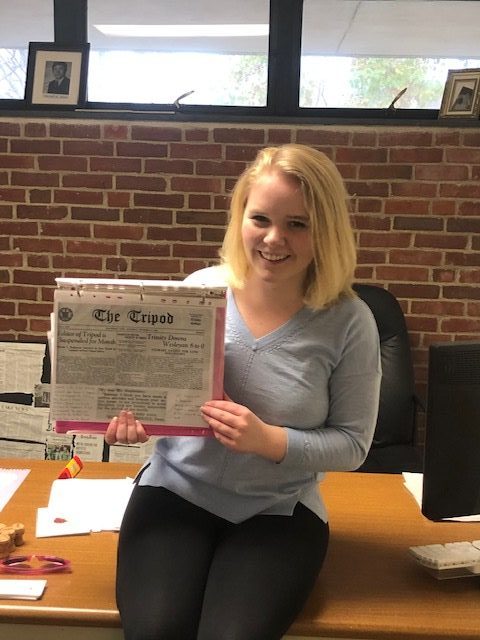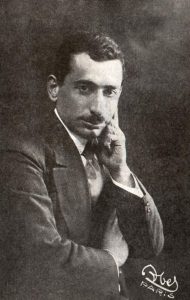Home » Asian History
Category Archives: Asian History
History Majors Awarded Prizes At 71st Honors Day Ceremony
Elizabeth M. Sockwell ’21 won the D.G. Brinton Thompson Prize In American History. Ms. Sockwell was awarded $500.00 with the prize. The prize is awarded to a thesis considered by the Department to be an excellent one in the field of American history.
Brendan W. Clark ’21 and Corey T. Cheung ’21 won the Miles A. Tuttle Prize. Mr. Clark and Mr. Cheung were awarded $700.00 with the prize. The prize is awarded to a senior whose thesis considered by the Department to be an excellent one any the field of history.
Brendan W. Clark ’21 won the George B. Cooper Prize In British History. Mr. Tuckwell and was awarded $300.00 with the prize. The prize is awarded to a senior majoring or minoring in History considered by the Department to have done excellent work in British history.
Brendan W. Clark ’21 and Tanuja A. Budraj ’21 won the Ferguson Prize In History. Mr. Clerk and Ms. Budraj were awarded $500.00 with the prize. The prize is awarded to a senior history major who has the best portfolio of essays. Essay portfolios consisted of three essays and a cover letter.
The George J. Mead Prize In History for Scholarship In Non-English Sources, the George J. Mead Prize in History, and the Gerald A. McNamara prize were not awarded this year.
Congratulations to Our Class of 2020 History Thesis Writers!
By Brendan W. Clark ’21
Editor; History Major
Congratulations to four of the History Department’s senior majors who presented the culmination of a year’s worth of research and study this past Friday!
Despite the difficulties which beset the end of their work from the coronavirus crisis, Gillian Reinhard ’20, Aidan Turek ’20, William Tjeltveit ’20, and Connor Struyk ’20 presented their research to the department’s faculty and friends via thoughtful presentations on Zoom.
Reinhard’s thesis, “Orientalist Opera: Western Perceptions of the Other in the Early Twentieth Century,” focused on the premiere of Giaccomo Puccini’s Turandot at the Royal Opera House in London during the 1920s. Reinhard relied on a variety of primary source material and newspaper coverage of the premiere and sought to examine the place and extent of Orientalism in the British imagination. Drawing on scholarship from noted British historians Robert Bickers, Sarah Cheang, and John MacKenzie, Reinhard also argued for a greater recognition of the opera as serving the imperialist ambitions of the British Empire. You can read more about Reinhard and her thesis, which were profiled by History@Trinity in November, here.
Senior Thesis Profile: Gillian Reinhard Talks Turandot and Tripod
By Brendan W. Clark ’21
Editor; History Major
Gillian Reinhard ’20 is the President’s Fellow in History, the Department’s inaugural Chatfield Fellow, and a senior thesis writer. History@Trinity’s Brendan Clark sat with Gillian to ask her a few questions about her thesis and her experience with the History Department.


- Describe your research topic in two minutes or less.
I am looking at the 1926 opera Turandot, by the Italian composer Giacomo Puccini. The first part of my thesis concerns how different cultures portrayed exoticism and embraced Edward Said’s concept of Orientalism. I am applying what I have learned in the first chapter to look specifically at how British audiences perceived Puccini’s opera when it arrived in London a year later, again from the perspective of Orientalism. The relationship between Britain and China is a unique one, with a long, complicated history, and I am hopeful that an analysis of this opera can shed light on this relationship.
- What specific aspects of your academic career at Trinity and your personal historical interests led you to select this topic?
Firstly, I have studied Mandarin Chinese since middle school and had the opportunity to study abroad in Shanghai during the fall of my junior year. My experience abroad truly shed light on the concept of Orientalism in the West. Also, I read Orientalism, by Edward Said, in my first-year seminar “Arabian Nights” with Associate Professor of History Zayde Antrim. That text has shaped much of my academic work. I decided to look at it through the lens of opera, as it has always been a quirky interest of mine.
History Department Welcomes Clark L. Alejandrino
Faculty members of Trinity’s History Department are very excited to welcome Dr. Clark Alejandrino as the new Assistant Professor of Chinese History. According to his faculty profile, “after finishing his undergraduate degree in history in the Philippines, Clark Alejandrino trained in Sinology in Australia and went on to finish a Ph.D. in East Asian Environmental History at Georgetown University. He specializes in the environmental history of China, especially its climate and animal history, covering the fifth to the twentieth century in his research. He is currently preparing a book manuscript on typhoons in the history of the South China coast and preparing to embark on a new project exploring the history of migratory birds in East Asia. At Trinity, he teaches courses on Chinese history, environmental history, world history, and Pacific history. He has received funding for his research from the Social Science Research Council, American Council of Learned Societies, Henry Luce Foundation, Chiang Ching-kuo Foundation, and the National Central Library of Taiwan.”
This year, Professor Alejandrino will be teaching “Climate and History”, “History of China: Shang-Ming Dynasty”, “History of Chiang: Qing Dynasty to Present”, and “River Cities of China.”
History Course To Visit Significant World War II Locations In Japan
By Brendan W. Clark ’21

Editor; History Major
The Trinity College History Department is offering a new course that will provide students with the opportunity to visit key sites of significant military action during World War II. Associate Professor of History and Department Chair Jeffrey Bayliss will teach the course, and Associate Professor of History Michael Lestz will join the visits, which include stops in Tokyo, Okinawa, and Hiroshima this June.
These sites, added Bayliss, each have significance to the military history of World War II and the experiences of Japanese and American soldiers. Bayliss added that “because the Japanese have memorialized the war in various ways, we can get into questions of historical and political memory” during the course.
“Killing Order”: Talaat Pasha’s Telegrams and the Armenian Genocide–A Lecture by Professor Taner Akçam

By Brendan W. Clark ’21
Editor; History Major
Taner Akçam is a Professor of History and the Robert Aram, Marianne Kaloosdian, and Stephen and Marian Mugar Chair in Armenian Genocide Studies at Clark University. He was one of the earliest Turkish academics to acknowledge the Ottoman commission of the genocide.
The Armenian Club of Trinity and the History Department welcomed Professor Taner Akçam, Professor of History and the Robert Aram, Marianne Kaloosdian, and Stephen and Marian Mugar Chair in Armenian Genocide Studies at Clark University to Trinity on Monday, March 19th. Professor Akçam spoke on his newest book, Killing Orders: Talat Pasha’s Telegrams and the Armenian Genocide. He discussed the significance of the telegrams and their role in affirming the Ottoman governments involvement in many of the events underscoring the Ottoman Empire’s perpetration of the Armenian Genocide.
Akçam began by addressing the continuing denials of the Turkish government, who deny the occurrence of the Armenian Genocide itself. This argument, argued Akçam, rests on the supposition that there was never an official decision by Ottoman authorities to exterminate Armenians. To augment their claims, Akçam cited the two strategies pursued by the deniers: that they have consistently hidden or destroyed the bulk of documentary evidence and that they continue to deny the existence of certain available documents.
History, Identity, and Traveling: A Reflection on 2017’s McGill Lecturer, Santiago Gamboa
Chelsey Crabbe (History ‘17)

In his lecture, “The Art of Narration and Travel Writing (a Latin American Writer in India)”,weaved an inspiring tale about the realities of his profession as both an individual and a Latin American writer by specifically focusing on his tales of living in India. Gamboa has written eight novels amongst other works, mostly in Spanish and translated into a variety of languages. The writer has also acted a Columbia diplomat at UNESCO in Paris as well as to the Columbian Embassy in India. Obviously well-accomplished, Santiago Gamboa impressed me not only with his accolades but his grip on the pulse of the world, understanding the humanity within each individual, no matter their country of origin.
(more…)
History Department’s Senior Thesis Presentations 2016-2017
This academic year, the History Department has nine honor thesis writers. Elizabeth, Sedona, Callie, Dylan, Elm, Chelsey, Eleanor, Seth and Andrew will be presenting on their research on Wednesday, May 3, 2017. The presentations will take place at Seabury Hall 215 (Trinity College), starting at 9:00 a.m. History Thesis Writers, History Majors, members of the History Department, and members of the Trinity and Hartford community are invited and encouraged to attend this special event. A five minute Q+A will follow each presentation. For the full schedule, continue reading….
(more…)
Trekking the Tamang Heritage Trail: A J-Term Course

Written by: Michael Lestz, Associate Professor of History
In January 2017 twenty-two students and faculty from Trinity College took part in an eighteen-day trek along the Tamang Heritage Trail in the northern area of Nepal close to the border with Tibet. All the trekkers were lured to Nepal by its spectacular mountains. Among the faculty leaders who joined the expedition were Professors Craig Schneider of Biology, Richard Prigodich of the Chemistry Department, and Coach Anne Parmenter who leads Trinity’s field hockey team. Schneider and Prigodich have led numerous similar expeditions in Nepal or Tibet in past years and Coach Parmenter is a supremely competent mountaineer who summited Mount Everest from the Tibetan side in 2006. Professor Christoph Geiss from Environmental Science, an experienced mountaineer and nature photographer, was also on board and created a spectacular photo record of the rugged terrain we crossed.
(more…)
Trinity International Hip-Hop Festival Program, April 7–10, 2016
From its creation in academic year 2005–2005 by a group of Trinity College students as a vehicle to “combat the disunity, segregation, and violence of Hartford, CT and Trinity College,” the Trinity International Hip Hop Festival always has close ties with several History majors and faculty.
One its co-founders, for example, was Jason P. Azevedo ’08, currently a career U.S. Department of State Foreign Service Officer specialized on Africa and Brazil.
Since 2009, History and International Studies Assistant Professor Seth Markle has served as the main academic advisor to Trinity Chapter of Temple of Hip Hop and annual Trinity International Hip Hop Festival.
As the coordinating group has put it, from the beginning the festival’s main strategies and goals have been using a “the historically education-oriented and politically revolutionary medium — Hip Hop – and focusing on its global potency and proliferation, the Trinity International Hip Hop Festival works to unify Trinity College, the city of Hartford, and the Globe.”
This year’s program, includes lectures and panel discussions with a variety of scholars, artists, and community activists; film screenings, graffiti and photo exhibits, workshops, and performances, including Dance Event / B-Boy Battle on Friday, April 8th (7pm–2am), the Saturday April 9th (8pm-2am) Hip Hop Concert, featuring Rakim and several other MCs and DJs. The festival ends on Sunday, April 10th with a DJ showcase and the Iron Poet Slam Competition.
You can find the Festival’s FULL PROGRAM here: 2016 Program for the Trinity International Hip Hop Festival – We hope to see you there!

